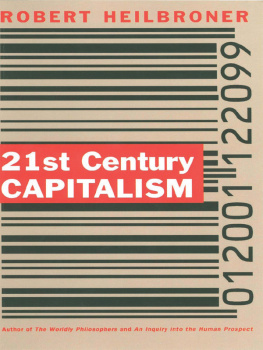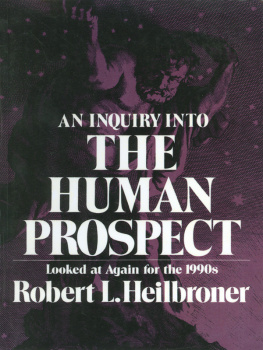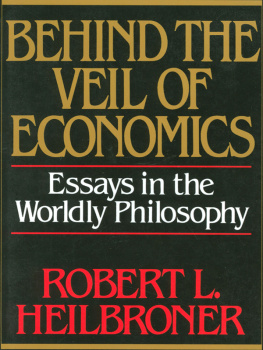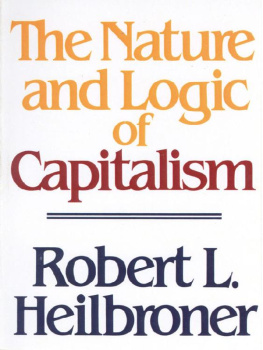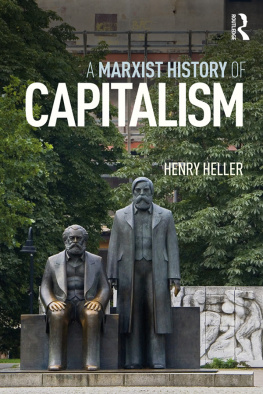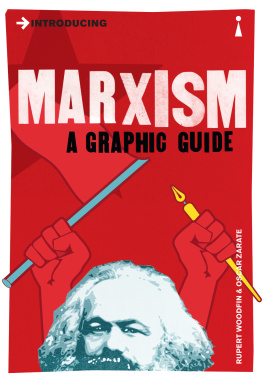
Books by Robert Heilbroner
The Debt and the Deficit
(with Peter L. Bernstein)
The Essential Adam Smith
The Nature and Logic of Capitalism
Marxism: For and Against
Beyond Boom and Crash
An Inquiry into the Human Prospect
Business Civilization in Decline
Between Capitalism and Socialism
The Economic Problem
The Limits of American Capitalism
Understanding Macroeconomics
A Primer on Government Spending
(with Peter L. Bernstein)
The Great Ascent
The Making of Economic Society
The Future as History
The Quest for Wealth
The Worldly Philosophers
Robert L. Heilbroner
Marxism:
For and Against
W W NORTON & COMPANY
NEW YORK LONDON
Copyright 1980 by Robert L. Heilbroner
Printed in the United States of America.
All Rights Reserved
First published in Norton paperback 1981
Library of Congress Cataloging in Publication Data
Heilbroner, Robert L
Marxism, for and against.
Includes index.
1. Marxian economics. 2. Dialectical materialism.
3. Socialism. 1. Title.
HB97 .5 .H37 1980 335.4 79-20385
ISBN 978-0-393-95166-0
ISBN 978-0-393-24262-1 (e-book)
W. W. Norton & Company, Inc., 500 Fifth Avenue, New York, N. Y. 10110
W. W. Norton & Company Ltd., 37 Great Russell Street, London WC1B 3NU
for my colleagues and students
Contents
I HAVE DEDICATED this book to my colleagues and students because it has evolved from a long dialogue with thema dialogue that has gradually brought me to the views set forth in these pages. Without saddling either colleagues or students with any responsibility for these views, I must make known my appreciation for the encouragement and criticism I have received from them. I could not have written the book without their help.
As so often in the past, I must place the name of Adolph Lowe at the head of my list of debts. There are few people who embody the attitude of for and against that I have taken as my own stance toward Marxism, but Adolph Lowe is one of these. I have relied heavily not only on his learning, but on his moral and aesthetic judgment.
Second, I am happy to write the name of Ronald Blackwell, who placed the extraordinary depth and breadth of his scholarship in Marx at my disposal, and who patiently read many drafts of the manuscript, and guided me away from misstatements and misunderstandings. Although Blackwell is as yet a graduate student and I am long a professor, in this undertaking the roles were more often than not reversed, to my great benefit.
Third, I wish to thank Stanley Burnshaw for a painstaking reading of the text, freeing it from many ambiguities and obscurities, and lending it an informed, skeptical, and insightful understanding.
I shall mention only in passing the names of other colleagues and students who have helped me with their advice: John Ernst, David Gordon, Kenneth Gordon, Virginia Held, and Anwar Shaikh. Lest I should inadvertently expose them to political risk, I omit with regret the names of two Iranian students who helped me greatly. Once again Lillian Salzman has brought forth a shining manuscript from a dreadful mess. And in the place of honor traditionally reserved for the end, I salute Shirley Heilbroner, who sustained me and endured my work, and thereby made the whole endeavor possible.
ROBERT L. HEILBRONER
New York City, May 1979
MARXISM IS AN unsettling presence in the modern world, the source of the most passionate hopes and fears, the most contradictory visions. But I do not want to begin a study of the subject by plunging directly into these troubled waters. Instead, let me pose a question that may stir my readers interest rather than his or her emotions: Why is it that the work of Marx, from which Marxism springs, exerts such fascination after more than a century? Or as the matter is often put: why should we still turn to Marx for insight into contemporary affairs, when the world has changed almost out of recognition from the time in which he wrote?
I think it is possible to answer these questions in a way that sheds light on the continued survival of Marxism in the face of a hundred debunkings and disproofs. It is that Marx had the good fortune, combined, of course, with the necessary genius, to create a method of inquiry that imposed his stamp indelibly on the world. We turn to Marx, therefore, not because he is infallible, but because he is inescapable. Everyone who wishes to pursue the kind of investigation that Marx opened up, finds Marx there ahead of him, and must thereafter agree with or confute, expand or discard, explain or explain away the ideas that are his legacy.
This kind of persisting influence is not, of course, unique to Marx. Perhaps the most striking example is that of Plato whose presence within philosophy is also inescapable. Before Plato, philosophers contented themselves with statements about the nature of things or about human understanding, but their dictahowever arresting and brilliantlacked the power of structured argument. It was Platos contribution to formulate a mode of philosophical discourse that emphasized reason, the meaning of words, and the crucial relationship between the knower and the known. In a sense, Plato thereby invented the task of systematic philosophy itself, which is why his influence is felt today even among philosophers who come to conclusions that are the opposite of his.
A similar persisting contemporaneity belongs to Freud. As with philosophy before Plato, there were certainly observers of the unconscious before Freud. But their insights and aperus lacked force or conviction because they were not articulated as part of a whole, or arrived at by a specified method. Freuds discovery of the unconscious as an integral part of mental life irreversibly changed the conception of the human psyche. Thus, whether or not present-day observers subscribe to Freuds particular theories or use his specific techniques, his presence, like Platos, is insistently at hand in the very task of psychoanalytic investigation itself.
Marxs importance derives from precisely such an achievement. His contribution, in some ways paralleling those of Plato and Freud, was the discovery of an unsuspected level of reality beneath the surface of history, above all beneath the history of the period that we call capitalism. What Marx inventedagain paralleling Plato and Freudwas a mode of inquiry to reach that buried reality, a mode we may call socioanalysis . Finally, as was the case with Plato, and as would again be the case with Freud, Marxs combination of insight and method permanently altered the manner in which reality would thereafter be perceived.
That is why, despite the changes that time has brought, Marxs Capital is still germane and relevant in a way that Adam Smiths Wealth of Nations , for all its marvelous discernment, is not. The difference is not merely that Marxs work is more modern than Smiths because of its emphasis on technology and crises and social tensions. The deeper reason is that Capital undertakes a task quite without precedent in Smith or anyone else, a task indicated by its subtitle: A Critique of Political Economy . This critique begins with the misperceptions the system imposes on those who have not learned to penetrate its faade, and who therefore remain at the level of its surface manifestations. Marxs first purpose is to show how the everyday concepts by which we seek to elucidate societyconcepts such as labor or capitalare, in fact, deceiving outward appearances that we must learn to pierce, if we are to understand the actual processes of social existence. We read Capital , therefore, not merely to discover how capitalism works, for Marxs explanation, though brilliant, is certainly imperfect, but to learn what capitalism is , the hitherto unposed question that Marx answers in a profound and unforgettable way.
Next page

